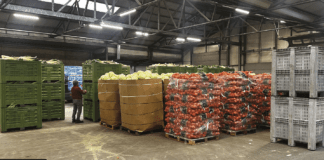After 12 months in which the sector witnessed its biggest business merge with Tesco, followed by the collapse of the trade’s second-biggest business, the wholesale landscape has been significantly altered.
With margins as tight as ever and overheads increasing, small and medium-sized wholesalers are at something of a crossroads. Times are tough and there is no silver bullet or deus ex machina that can instantly shoot you out of the red and into the black. But, for those who really want it, the chance to thrive is out there.
We spoke to nine of the most inspiring wholesalers in the channel to hear about their priorities for 2018 – the areas they believe will lead them to the pot of gold at the end of the rainbow.
 Debbie Harrison
Debbie Harrison
Joint managing director,
Pricecheck
“Our key principles for 2018 will continue to centre on our passion for excellent customer service and our desire to grow Pricecheck through new markets and products. Turnover has doubled in recent years and 2018 is on track to be the most successful year in our history. We are committed to being a one-stop shop for convenience and independent retailers by offering a great mix of products and services. Our food, drink, confectionery and alcohol categories have provided new areas to grow in, building on our successful foundation in toiletries.
“In December, we bought additional warehousing facilities to ensure high customer service standards continue to be met amid continuing trade growth. We strive to ensure our customers can place and receive orders efficiently and an investment in our IT infrastructure will also assist us in this mission. We are lucky to have a strong team who can quickly adapt to changes in retail and product trends. This year, we will keep training them to ensure their passion and drive is at the forefront of all our partnerships.”
 Guy Swindell
Guy Swindell
Head of customer development and marketing,
Parfetts
“With all that has gone on, it is going to be difficult for wholesalers to focus on just one area if they are going to continue to grow in the market. It is not enough to identify what already works – wholesalers must look beyond that if they want to thrive. Customer service is fundamental to achieving this. We are focusing on this area by making our business model similar to Apple’s. Customers can come in to a Parfetts depot and talk one-to-one with staff about key areas such as merchandising and legislation.
“Digital is another area that needs to be focused on. Click & collect is really important – the fact we have seen online sales grow from 5% when we started a few years ago to 25% now emphasises this. Another area to consider is that it is not just retailers who should be focusing on supermarket standards, but wholesalers as well. They should look at areas such as loyalty schemes and overall presentation of their brand and depots, as these have become the standard that is expected.”
 Tom Mathew
Tom Mathew
Director,
Dunsters Farm
“There is understandably concern among small and medium-sized wholesalers about the recent changes in the foodservice industry landscape. Increasingly powerful competitors do pose a threat. However, at Dunsters, we are determined to focus on the advantages of being smaller and more agile. In 2018, we aim to continually improve our levels of service and the customer experience. One such project we are working on is firm-wide integration of our CRM system so that customer queries and issues are dealt with as quickly as possible.
“We are also investing in the training and development of our staff, as the old saying ‘people buy from people’ still holds true. We are always willing to go that extra mile for our customers but we know customer service is something that can continually be improved. The customer is central to every key decision we make, but only by having great staff do you create the best possible customer experience. We have recently introduced some new award schemes and incentives, and we will also be continually looking for ways to make Dunsters a great place to work.”
 Nick Ramsden
Nick Ramsden
Managing director,
Ramsden Group
“In recent weeks, we have seen our business – which includes Dee Bee Wholesale – pick up significantly, primarily due to the unfortunate collapse of Palmer & Harvey (P&H). On the delivered side, turnover has gone up by 25% and we are having to turn things away, which is an interesting position to be in. I have never seen so much opportunity out there.
“To ensure that we turn this into extra profit, we are assessing our cost base. This is particularly important, with inflation at an all-time high and the National Living Wage going up again in April, so we are analysing every expense to see what we can influence and what to save on. For example, we need to make better use of electricity – energy-efficient lighting is something that could help us become more profitable. But alongside this, you need to ensure that your service levels remain high. What happened to P&H serves as a warning, given the paper-thin margins in our sector and the continued dominance of pricemarked packs with diminishing shared margin.”
 Coral Rose
Coral Rose
Managing director,
Country Range Group
“High levels of service are absolutely everything for those wholesalers looking to thrive in 2018 – your business needs to be completely customer-centric. You have to make sure you are an integral part of your customers’ businesses and that can be in the way that you provide, say, meal solutions or menu suggestions. As some wholesalers get bigger, they can start to lose touch when it comes to fulfilling customers’ local needs. You always have to listen to and understand your customers, and it is also good to keep up with industry happenings, such as the incoming ‘sugar tax’, in order to keep your customers informed of things like this.
“The three main points of contact in your business for customers– telesales, field sales and drivers – all have to represent you in a way that shows how much you care about them. Alongside this, being part of a buying group such as Country Range is an essential way for wholesalers to grow their businesses. This way, you can share best practice with and learn from other inspiring members in the group.”
 Richard Hunt
Richard Hunt
Managing director,
Hunt’s Foodservice
“To thrive in the coming year, we will be committed to investing in the business. Particularly, investment that will not only deliver the short-term benefits that everyone in this sector could do with, but that will also help the business to keep its core values and competitiveness in the future – something that is just as important.
“We have found that investment in people and technology tend to go hand in hand. To this end, we are streamlining our business operations by introducing new technology. We are highly fortunate in that we have a young and dynamic operations department that is willing to embrace the technology that we implement. This, in turn, allows us to get the most out of the resources at our disposal. Introducing new technology into the business also makes it easier for us to manage bigger teams of people. This is beneficial as it means we can employ more local people and talented professionals, and this, of course, helps us in yet another way to make the business grow.”
 Andy Kemp
Andy Kemp
Group sales and marketing director,
Bidfood
“Being customer-first is critical to success in this channel and that has to be in every single aspect of the business every day. About three years ago, we hired an insight manager from Waitrose. We had always benchmarked ourselves against other wholesalers, but we have shifted to benchmarking ourselves against the likes of John Lewis and Amazon – the companies our customers shop with in their personal lives – to ensure that we are best in class.
“We have trained everyone in our team to show them what excellence looks like and what falling short can mean. In one of our training videos, there is an example of a delivery made to a nursing home. One of the ladies in the home enjoys baking cakes for everyone. If we forget to provide the flour as part of that nursing home’s order, we miss the day she enjoys making her cakes. One of the things we say at Bidfood and that we try to aspire to is ‘care, share, dare’ – it is good advice for those looking to thrive in the current market.”
 Malcolm Grantham
Malcolm Grantham
Business development manager,
SOS Wholesale
“Providing better availability and service levels is fundamental for wholesalers looking to thrive in the current market. We have the necessary tools to support us on the latter front, for instance. When it comes to availability, though, we need suppliers to up their game. There has been a downturn in availability on some key products and we need everyone’s help here if we are to succeed.
“This year, we will be trying to ‘sell’ ourselves and raise our profile more by attending a number of trade shows and exhibitions. Getting out and meeting people is vital. Our range is about 4,500 lines and we could do more there, perhaps, as there are categories in growth that we are not currently supporting, such as protein.
“In-house or private-label development is also important, as it makes us unique and is exclusive to us, so we have to make sure we get that message across to customers. You cannot afford to stand still – you have to be on your toes, you have to be entrepreneurial and you have to put yourself out there.”
 Telly Sarai
Telly Sarai
General manager,
SK Food & Drinks
“This year, it is all about pushing the loyalty button of our customers and ensuring that we provide a suite of services that allows us to stand out. Take retail clubs, for example. They are now one of the only tools left to hook retailers. For some, it can go on the backburner, especially when you see the customer, ask them to take the point-of-sale material and they say, ‘Sorry, there is no room in the van.’ But we are now more proactive in helping them with that – we send out the kit they need free of charge, making sure it arrives at least one week before it needs to be activated in-store.
“Other areas we will be looking at this year are getting more customers shopping through the website, making better use of the click & collect service and expanding the capabilities of the delivery operation. We are determined to make delivery more efficient and we have business development managers out on the road winning new customers in new postcodes that align with delivery routes we are currently making. Trade weeks, more so than trade days, are also an increasingly useful tool for us. With all of this combined, we are hoping for a successful 2018.”











